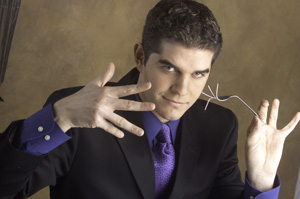It was 2:30 a.m. when constables from the office of the Israeli Ambassador to Mexico knocked on the door of Ehud Segev's hotel room in Cancun. Weeks before they appeared, Segev sensed that something terrible was about to happen…
“I knew exactly what they were going to say,” he says.
Also known as “The Mentalizer,” Segev, a 27-year-old magician from Safed with exceptional powers of mind control, thought transmittal, telekinesis and hypnosis, had just finished a performance. He was on a three-month tour of Mexico.
“When I opened the door, they didn't have to say a word,” he says. But they did say a few words: four most horrible words that would change Segev's life, “Your brother is dead.”
Segev's only sibling, his elder brother Nimrod, 28, had been killed by terrorists during the war between Israel and the Hizbullah terror group in southern Lebanon. Nimrod was serving in the Israel Defense Forces (IDF) as a reserves soldier. A member of the armored battalion (tanks) unit, Nimrod was killed by Hizbullah terrorists in the southern Lebanese village of Aita Al-Shaab on August 9, leaving behind his wife, Iris, their two children, Vick, 9, and Omer, 3, his parents, and his brother Ehud.
“There are really no words to describe how I felt when I heard the news,” says Segev. “I was completely devastated, broken, crushed. He was my only brother, my closest friend, my second half, my everything.”
Before he knew it, Segev was on a flight back to Israel, arranged by the Israeli consulate. “Here I was, after receiving the worst news of my life, and for the next 20 hours I couldn't mourn properly with my friends and family. It was just me, alone, not connected to anything, suspended between heaven and earth,” says Segev. “This is where I formulated my idea.
“I took all the pain that welled up inside of me and I told myself that I had to use this pain to do something to make the world a better place,” he says. “My brother's death was a message to me. The freedom that my brother was fighting for is the freedom of the whole free world. Radical fundamentalists have taken our freedom hostage and we must not let them win. We must take our freedom back. This is my life mission and I will continue on this mission for as long as I live.”
Beyond military and political solutions, Segev suggests there is something that each and every one of us – regular civilians – can do to combat terrorism. According to Segev, a lot of people think terrorism is someone else's problem. They say it's Israel's problem, but Israel is just one small example of the free world that these terrorists seek to destroy; or they say it's up to their governments and their armies to solve the problem of terrorism.
“But there is something that we, regular people, can do to change the fate of the world, and in fact only we have the power to effect real change,” he says, and quotes American cultural anthropologist Margaret Mead, “Never doubt that a small group of thoughtful, committed citizens can change the world. Indeed, it's the only thing that ever has.”
THAT'S WHY Segev created “Freefreedom,” the International Freedom Coalition, which aims to gather citizens of the world together to fight against terror and work for the freedom of the world's citizens.
“I want a coalition of civilians; not soldiers and not politicians, but masses of everyday people, to unite and do whatever they can to wake up the world to the reality we are all facing: that our freedom is under threat.” Since his brother's funeral, which took place in Rosh Pina on August 13 and was attended by nearly 2,000 people, Segev has done his fair share of waking up the world. He broadcast Freefreedom's message on Israeli national TV Channel 1 and on CNN; his plea made the front page of The New York Times, and he launched Freefreedom's website – www.freefreedom.org – which has already gathered the support of nearly 10,000 people from around the world, who have translated Segev's eulogy to his brother into eight different languages.
“Some may say I am being na ve, but I can think of many instances wherein the power of the people changed the world,” he says, listing civilians' responses to threats such as Communism.
“In so many places, civilians were fed up with the status-quo and single-handedly led a revolution. Regular people like you and me can change the world.
“We have also seen what happens when civilians are quiet and do nothing,” he says, pointing to the Holocaust.
“Terrorists are raising their voices in statements of victory. We have to speak up louder. We need to fight for our freedom as strongly as the terrorists fight to destroy freedom. We can't just sit back and relax. It's time to be responsible and take the future into our own hands!”
THE SOLUTION, according to Segev, lies in the convergence of civilians from around the world – the joining up of what he says is the majority of regular people, who want to live happy, fulfilled, normal lives, free of radicalism.
“It's about building bridges between like-minded civilians,” he says.
Civilian-to-civilian project ideas include setting up a forum for civilians in war-torn areas to contact one another, for example Israeli and Lebanese civilians; setting up joint Muslim, Jewish and Christian concerts to entertain all populations and send them the message of freedom; and perhaps most important, raising money to counteract the funds spent by terrorists on seducing their country's civilian populations.
“We cannot change the radical ideologies of terrorists who exist now. We have no choice but to fight them on the battlefield and through public policy. But I am interested in the future.”
He is in the midst of consulting with coalition members and professors from top universities in Israel on the issue. According to Segev, “We in the free world need to reach out to non-fundamentalists in the Muslim world before the terrorists get to them. We need to care more; do more; act more. We need to give them other options besides extremism. We need to give them a reason to choose life, to choose freedom.”
Segev's hope is that Freefreedom's civilian network will be so strong that no one – including international policy-makers – will be able to ignore it.
“I see Freefreedom becoming the biggest grassroots civilian lobby campaign in the world,” he says. “If citizens will rise, governments will change.”
According to Segev, youth have a very strategic role to play in the plan. “Youth around the world are essential to the success of the project. Let's face it. Our generation is messed up. But there is an idiom in Hebrew that says ‘the darkest point is just before the dawn,' and that's how I see it. We are now in such a big darkness, but we are on the cusp of dawn. And with the support of the world's youth, we will prevail against the darkness,” he says.
Segev calls on young adults around the world to build bridge
s.
“Youth can touch other youth and can prove that the gaps between them and ‘the other' can be overcome.” Segev advises youth to take an active role in their future and in the future of the world they live in.
“Starting this project has given me so much more power to deal with the pain of Nimrod's loss,” says Segev. “The only thing that keeps me going is the belief in a better future. But the torch I carry is a heavy one and I need as much help as I can get to carry it. We are all of us brothers.”
This article can also be read at http://www.jpost.com /servlet/Satellite?cid=1159193374263&pagename=JPost%2FJPArticle%2FShowFull
 Mentalist Ehud Segev (The Mentalizer) New York City NYC Successful Mind
Mentalist Ehud Segev (The Mentalizer) New York City NYC Successful Mind





